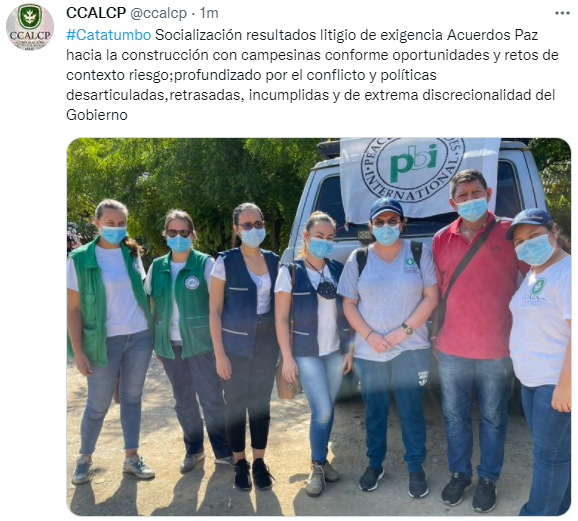
On December 3, PBI-Colombia tweeted: “Today we met with @ccalcp before accompanying them to Caño Indio, Catatumbo, for a meeting with communities included in the guardianship actions to guarantee the #DDHH [human rights] within the framework of the implementation of points 1, 3 and 4 of the Agreement of peace.”

Those chapters in the Peace Agreement are:
1- Towards a New Colombian Countryside: Comprehensive Rural Reform (p. 10-33)
3- End of the Conflict (p. 57-103)
4- Solution to the Illicit Drugs Problem (p. 104-131).
Earlier this year CCALCP tweeted: “Breaches of the National Comprehensive Program for the Substitution of Illicit Crops (PNIS) in Catatumbo will be studied by the Constitutional Court in a guardianship review filed by CCALCP together with [other organizations].”
The PNIS is a crucial component of the Peace Agreement.
Under the program, farmers agreed to voluntarily uproot their coca fields. In exchange, the government would provide subsidies and training programs to help them swap illegal crops for alternative, legal ventures.
Instead, the Colombian government has pursued a controversial fumigation program to eradicate coca crops by spraying the herbicide glyphosate from airplanes.
Adam Isacson of the Washington Office on Latin America (WOLA) has cautioned that the resumption of fumigation could spur a wave of violent rural protests and blockades that could be as dramatic as the mass national strike protests this year.
Ten United Nations Special Rapporteurs have also told the Colombian government: “[Spraying poses] enormous risks for human rights and the environment, at the same time that it would not comply with the conditions established in the ruling T-236 of the Constitutional Court, nor with international obligations. in the matter.”
T-236 concluded there are elements to affirm, provisionally, that glyphosate is a toxic substance that, depending on the level of exposure, can cause cancer or have other health implications.
The Peace Brigades International-Colombia Project has accompanied the Luis Carlos Pérez Collective Lawyers Corporation (CCALCP) since 2006.
#Catatumbo Socialization results of the lawsuit demanding Peace Agreements towards construction with peasant women according to opportunities and challenges of risk context; deepened by the conflict and disarticulated, delayed, unfulfilled and extremely discretionary policies of the Government.


